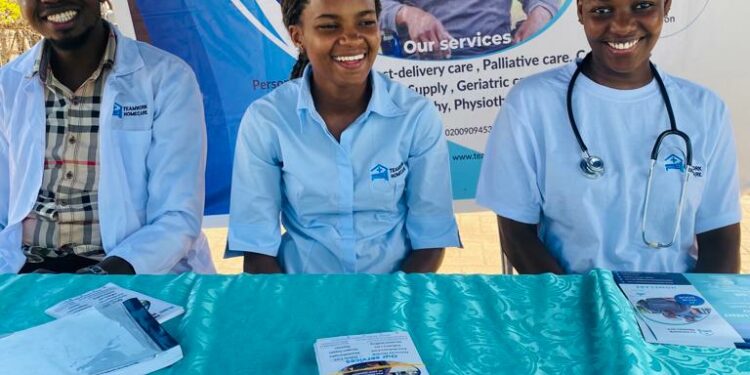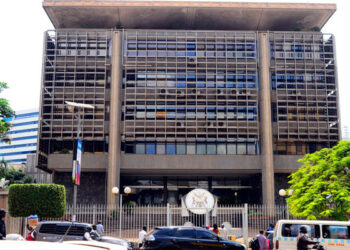By Michael Kanaabi Dollar
Cancer in general is becoming a challenge to Uganda’s health system with research showing approximately 110 of every 100,000 men in Uganda are diagnosed with cancer while 92 of every 100,000 women are diagnosed cancer annually according to a lengthy study whose findings were published in 2023.
Among all the Cancers which have rendered our health system inadequate to manage is Kaposi’s sarcoma also known in the local Ugandan dialect Luganda as Kisipi is the most common accounting for between 50-70% of all cancers diagnosed in health facilities across the country.
It is more common among HIV Aids patients where prevalence is estimated to stand at between 10-20% of all Aids patients also being diagnosed with Kaposi’s Sarcoma.
“These figures call for urgent intervention from all stakeholders especially us health workers to effectively help patients manage this disease and also educate the masses about it to curb side effects and increased spread” Medical Professional and Teamwork Homecare Services CEO Julius Habumugisha says.
What is Kaposi’s Sarcoma?
Kaposi’s sarcoma (KS) is a type of cancer that affects the skin and mucous membranes, and is prevalent in Uganda, particularly among people living with HIV/AIDS.
Types of Kaposi’s Sarcoma
According to Dr. Fred Mutamba a Consultant General Practitioner attached to Teamwork Homecare Services, there are 4 major types of Kaposi’s Sarcoma. These are Classic Kaposi’s sarcoma characterised by it’s slow growth, it mainly affects older men of Jewish and Mediterranean origin.
Endemic Kaposi’s Sarcoma which is common among people of African descent and does affect people of all ages.
Latrogenic Kaposi’s Sarcoma is associated with mainly people who undergo organ transplant.
Epidemic Kaposi’s Sarcoma is the most common type especially in countries where there is a high prevalence of HIV Aids Dr. Mutamba notes.
What causes Kaposi’s Sarcoma ?
Kaposi’s Sarcoma is primarily caused by the Human Herpes Virus -8 and is in many cases also referred to as Kaposi’s Sarcoma Herpes Virus.
According to Medical Professional Julius Habumugisha, this disease is transmitted through sexual intercourse, blood transfusion, organ transplant and mother to child transmission mainly.
He notes that people with weakened immune systems are more susceptible to Kaposi’s Sarcoma including those suffering from HIV Aids, those undergoing chemotherapy treatment for cancer, those that have undergone organ transplants and the Elderly.
A number of environmental factors Habumugisha says may contribute to the development of full blown Kaposi’s Sarcoma for example continuous exposure to certain chemicals or toxins like mercury, exposure to radiation including Ultra Violet rays from sunlight.
Having co-infections of bacterial and viral nature for example HIV-1 and HIV-2, Cytomegalovirus (CMV) Epstein-Barr Virus (EBV) and bacterial infections like Tuberculosis may easily lead to one acquiring Human Herpes Virus and Kaposi’s Sarcoma as well Habumugisha adds.
What factors increase the risk of acquiring Kaposi’s Sarcoma?
It is important to note that the disease is more prevalent among men the ratio of men to women suffering from this disease being on average 3:1 for a number of reasons.
Dr. Godfrey Habomugisha a Senior Consultant with Teamwork Homecare Services says men have a higher risk of acquiring Kaposi’ssarcoma because they are more likely to engage in high risk sexual behavior like having unprotected sex with various partners increasing the chances of getting HIV Aids and Kaposi’s sarcoma as well.
He says, “Men are also more likely to acquire the Human Herpes Virus 8 through sexual contact and they also engage in occupations like mining and construction which expose them more to dangerous chemicals and gases making them more susceptible to the Virus and increasing the risk of getting the ddisease”
Men also often delay to seek medical intervention at times leading to delayed diagnosis when the disease has already spread.
The biological and genetic differences between men and women also contribute to the disease manifesting more in men than women he notes.
Other factors that increase the risk of getting Kaposi’s sarcoma include genetic factors which make some people more prone to catching the disease than others.
Having co-infections of other viral and bacterial diseases like HIV Aids, CMV and EBV do significantly increase the risk of getting Kaposi’s Sarcoma.
Incase one has been on immunosuppressive drugs and therapies for a long time such as corticosteroids, Dr. Habomugisha observes that the chances of catching Kaposi’s sarcoma do increase.
Coming from a family with a history of Kaposi’s Sarcoma and also from geographic locations where the disease is common for example in Africa and the Mediterranean.
When one’s immune system has been weakened by diseases such as HIV Aids, their chances of getting Kaposi’s Sarcoma increase according to Dr. Habomugisha.
Being infected with the Human Herpes Virus is also an important factor in developing Kaposi’s Sarcoma.
Being of advanced age that is 60 years and over also increases the chance of getting the disease.
Dr. Habomugisha also points out that People who have undergone organ transplants are at increased risk of Kaposi’s Sarcoma due to immunosuppressant medication they are put on.
Chemotherapy or radiation therapy treatment also compromises immunity increasing one’s chances of getting Kaposi’s Sarcoma he adds.
Skin trauma such as severe burns or cuts increase the chances of one getting Kaposi’s Sarcoma plus poor hygiene and nutrition s well.
What are the signs and symptoms of Kaposi’s Sarcoma?
Teamwork Homecare’s Julius Habumugisha says, “The symptoms include those that usually manifest on the skin and these include lesions which first appear small, flat and painless purple, pink or brown in colour.”
He notes that these may later grow into nodules which are either soft or firm when touched, lesions which later merge and form patches which vary in size also do appear.
Colour changes will also be noticed on the skin with darkening or lightening occurring around the lesions.
Kaposi’s Sarcoma according to Habumugisha also manifests with mucosal symptoms and mouth lesions on the wall and lips including the tongue, gums and palate.
Throat lesions can also occur in the throat causing difficulty in breathing and swallowing.
According to Habumugisha, Gastrointestinal lesions can also result from one having Kaposi’s Sarcoma and further symptoms like bleeding, abdominal pain and diarrhea will also be seem.
When Kaposi’s sarcoma attacks the lymph nodes symptoms which include swollen lymph nodes as a result of enlargement and tenderness caused by the disease is realized.
Pain and discomfort as a result of swelling that may affect both legs and arms.
In some cases patients will experience enlargement of the spleen and liver with cases of coughing, shortness of breath and chest pain due to the lungs being affected.
Other symptoms include persistent fatigue and weakness, unintentional weight loss, recurring fever and night sweats it hot flashes according to Habumugisha.
If skin lesions persist repeatedly they will lead to skin thickening and scarring.
How is Kaposi’s Sarcoma treated?
The patient’s overall health, location of the cancer and type of Kaposi’s sarcoma plus the severity of the disease all determine which will be the most effective form of treatment according to Dr. Fred Mutamba.
For HIV Aids related Kaposi’s Sarcoma, he says, “Anti Retroviral therapy is the main form of treatment. It suppresses the HIV Aids virus allowing the immune system to become stronger and fight off HHV-8 (Human Herpes Virus) which is the cause of the cancer.”
In several cases, chemotherapy is used to treat Kaposi’s Sarcoma. Medications like Lipisomal anthracylines, paclitaxel, vinblastine and bleomycin among others are used here Dr. Mutamba notes.
For localised lesions resulting from Kaposi’s Sarcoma, radiotherapy is used when it comes to the skin and lymph nodes.
Another treatment option is immunotherapy with interferon- Alpha, interleukin-12 and other prescriptions.
Treatment of Kaposi’s sarcoma can also be done using targeted therapies which focus on specific molecules involved in the growth of the cancer. These Dr. Mutamba says include sirolimus (mTOR) inhibitor and imatinib (PDGFR inhibitor) among others.
Doctors might also opt for surgical removal of localised Kaposi’s sarcoma lesions to relieve symptoms through excisional biopsy and debulking surgery as key procedures.
In summary Dr. Mutamba emphasizes that combining multiple treatments does improve the outcomes and in a number of cases Anti-retroviral treatment maybe combined with chemotherapy, radiation therapy or chemotherapy may also be used together with immunotherapy.
Management of symptoms and side effects of the treatment is also crucial and this is referred to as supportive care. It does take the form of pain management, wound care and nutritional support.
A number of new experimental treatments for this cancer are also being explored and these include gene therapy, adoptive T-cell therapy and check point inhibitors.
Alternative treatments
According to medical experts, these alternative therapies should be used alongside conventional medicine to ensure best results and not be used to replace the prescribed treatment.
These include acupuncture for pain management, herbal remedies like astragalus, curcuma an immune booster and artemisia annua.
A healthy diet packed with whole grains, fruits, vegetables to support the immune system, mind-body therapies which include yoga can reduce stress.
Homeopathic remedies like carcinosin and thuja to treat symptoms, aromatherapy where by essential oils like lavender and tea tree oil are used for their antiviral and anti-inflammatory properties.
Massage to reduce stress, improve circulation and manage pain, chiropractic adjustments to improve immune function and overall health.
Dietary supplements like Vitamin C and D plus Omega 3 fatty acids to support one’s immunity, ozone therapy which involves the use of ozone gas to stimulate immune response and cut back growth of tumors.
Others include hyperthermia, reiki and energy healing to kill cancer cells plus cannabis which helps manage pain and has anti cancer properties.
Remember to consult a healthcare professional before exploring alternative therapies, as they may interact with conventional treatments or have side effects.
How do you prevent Kaposi’s sarcoma?
Practising safe sex according to Medical Professional Julius Habumugisha of Teamwork Homecare Services which includes using condoms consistently to avoid catching HHV-8 is key.
Getting tested regularly if you are operating in high risk environment of catching this virus is also effective Habumugisha observes so that you can know your status and take the necessary precaution.
Avoid sharing needles so that you can minimize the chances of getting into contact with blood and body fluids of a Human Herpes Virus patient.
Do not have an organ transplanted from some one infected with HHV-8 (Human Herpes Virus)
Take maximum precaution Incase of a blood transfusion to avoid getting into contact with blood of an HHV-8 infected person.
Ensure you maintain a healthy and strong immunity Habumugisha emphasizes by engaging in activities that boost your immunity like eating a balanced diet, exercising regularly, keeping stress levels down and having enough sleep among other healthy practices.
Use protective equipment like gloves and masks when handling bodily fluids especially when working in a healthcare setting to avoid contact with body fluids that may contain the virus.
Avoid close contact with infected people and sharing personal items like towels, razor bloods and ensure good personal hygiene which involves always washing hands when you get into contact with infected persons.
Monitor oneself consistently if you are in a high risk environment where Kaposi’s Sarcoma is rampant and seek immediate medical intervention in case any signs manifest.
For those infected with HIV, ensure you take your anti-retroviral drugs consistently as prescribed by the Doctor to keep the virus at bay and minimize your chances of getting Kaposi’s Sarcoma as a result.
National Interventions
Experts recommend increased access to HIV testing and treatment, roll out of more education and awareness campaigns on Kaposi’s Sarcoma and related ailments, strengthening of the health infrastructure in place to accommodate the growing burden of this disease.
Finally encouraging and funding research and development of new better treatments for the disease will also bring it under control.
Email: michaelkanaabi@gmail.com
WhatsApp: +256701133509
Do you have a story in your community or an opinion to share with us: Email us at editorial@watchdoguganda.com













